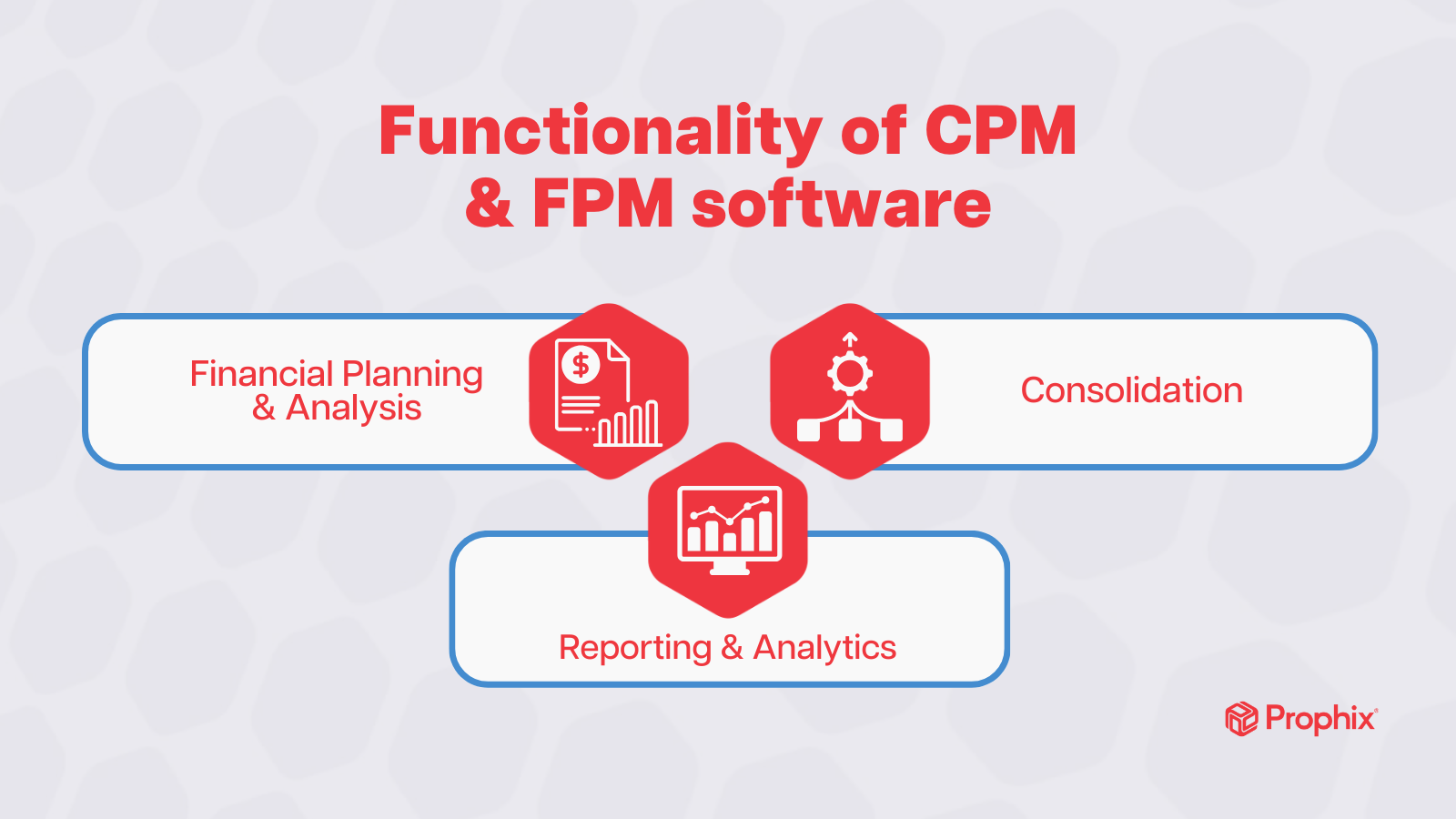What’s the difference between CPM and FPM?
As finance continues to evolve, the rise of technology has made the need for better performance management practices more important than ever.
You need accurate and timely financial information to make informed decisions, and to do that, you need an effective performance management tool, like Corporate Performance Management (CPM) or Financial Performance Management (FPM) software.
But what’s the difference between Corporate Performance Management and Financial Performance Management? And how do I choose between them?
In this blog post, we’ll discuss:
- What is CPM?
- What is FPM?
- What’s the difference: CPM vs. FPM
- The benefits of FPM software
- Choosing the best software for your business
After reading this article, you’ll understand the subtle differences between Corporate Performance Management and Financial Performance Management, and how to choose the right software for your business.
What is Corporate Performance Management (CPM)?
Corporate Performance Management (CPM) is a comprehensive approach to business performance management that integrates strategy, planning, and execution. CPM help businesses track key performance indicators (KPIs) and monitor their impact on performance. This enables businesses to make better-informed decisions and leverage best practices to achieve their goals. CPM can also refer to specialized software that helps companies perform these functions.
The term Corporate Performance Management was first recognized in 2001 by the analyst firm, Gartner. Over the past 20 years, however, the function of the finance department has fundamentally changed, and shifted their focus to agility and strategic inputs. So, in 2017, Gartner retired their CPM category and shifted their focus to Financial Planning & Analysis (FP&A) and Financial Close.
Vendors in this CPM space have also slowly shifted their language to reflect this change, and that’s when the term Financial Performance Management was introduced.
What is Financial Performance Management (FPM)?
Financial Performance Management (FPM) is a subset of Corporate Performance Management that focuses specifically on managing financial performance. FPM software enables finance leaders to monitor the financial health of their business, analyze profitability, and optimize financial processes.
Financial Performance Management has gained popularity in recent years, as more vendors shift their focus to supporting finance in driving business performance. The term Financial Performance Management can also be used to describe Enterprise Performance Management software, as well as Financial Planning & Analysis software.
What’s the difference? Corporate Performance Management vs. Financial Performance Management
Corporate Performance Management (CPM) and Financial Performance Management (FPM) are two terms that are often used interchangeably. While CPM and FPM support a similar set of business processes, which help organizations achieve their financial goals and objectives, there are distinct differences between CPM and FPM.
However, CPM encompasses a broader array of business performance management tools and functionality. In addition to financial performance metrics, CPM software may include non-financial KPIs, like employee performance, customer satisfaction, or product quality. As a result, CPM software can help manage other facets of the business beyond finance.
On the other hand, FPM is specifically focused on the financial aspects of an organization. It provides a narrower, yet in-depth view of an organization's financial health. FPM software is designed to help finance teams better understand and manage their financial operations and make data-driven decisions.
Both CPM and FPM can contain functionality for:
- Financial Planning & Analysis - Budgeting, planning, and forecasting
- Consolidation - Financial consolidation, financial close, and intercompany management
- Reporting & Analytics - Management, regulatory, and financial reporting, and ad hoc analysis

And share several common attributes, including:
- Used to manage a business
- Collaborative tool (e.g., not a personal productivity tool like spreadsheets)
- Non-transactional (unlike an accounting system or Enterprise Resource Planning (ERP) software)
- Used to automate processes in finance and beyond
- Records and analyzes what has happened in the past but also allows you to look into the future
- Applications can interact with each other – for example, budgets, plans, and forecasts are used when reporting on results
The benefits of Financial Performance Management software
The primary advantage of FPM software is its ability to support strategic decision-making with precise data and comprehensive analysis. Organizations that invest in FPM software can leverage a variety of benefits, including automation, mitigated risk, and intelligent insights, which improve visibility into and control over financial performance.
Automation = Efficiency
FPM software can significantly improve productivity by automating routine tasks, including budget updates, data collection, and compliance report management. By eliminating manual inputs, your team can allocate more time to strategic activities.
Mitigated risk = Precision
When your finance team handles large amounts of data, there’s the potential for human error to be introduced and formulas to be broken. By automating your core financial processes, you can mitigate these risks, and enhance your overall operational efficiency.
More insights = Enhanced decision-making
The current market is unpredictable, and so every decision a potential risk. FPM software enables finance teams to create scenario plans to identify the most advantageous strategy. This also supports intelligent, more profitable decision-making.
Choosing the best software for your business
As we’ve discussed, there’s a lot of similarities between Corporate Performance Management (CPM) and Financial Performance Management (FPM). CPM is focused more on the organization as a whole, whereas FPM specifically supports finance in driving performance. Vendors may use these terms interchangeably to refer to software that supports business performance.
If you’re a CFO or Financial Analyst, we recommend choosing an FPM vendor, who has designed their solution with your specific needs in mind. This will also ensure that you can scale the software to support your growth and future processes.
